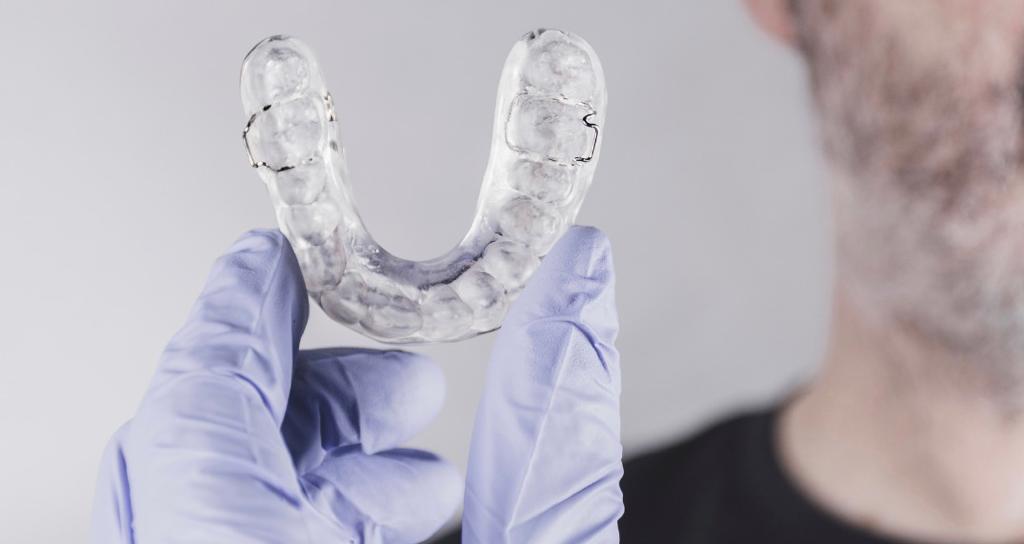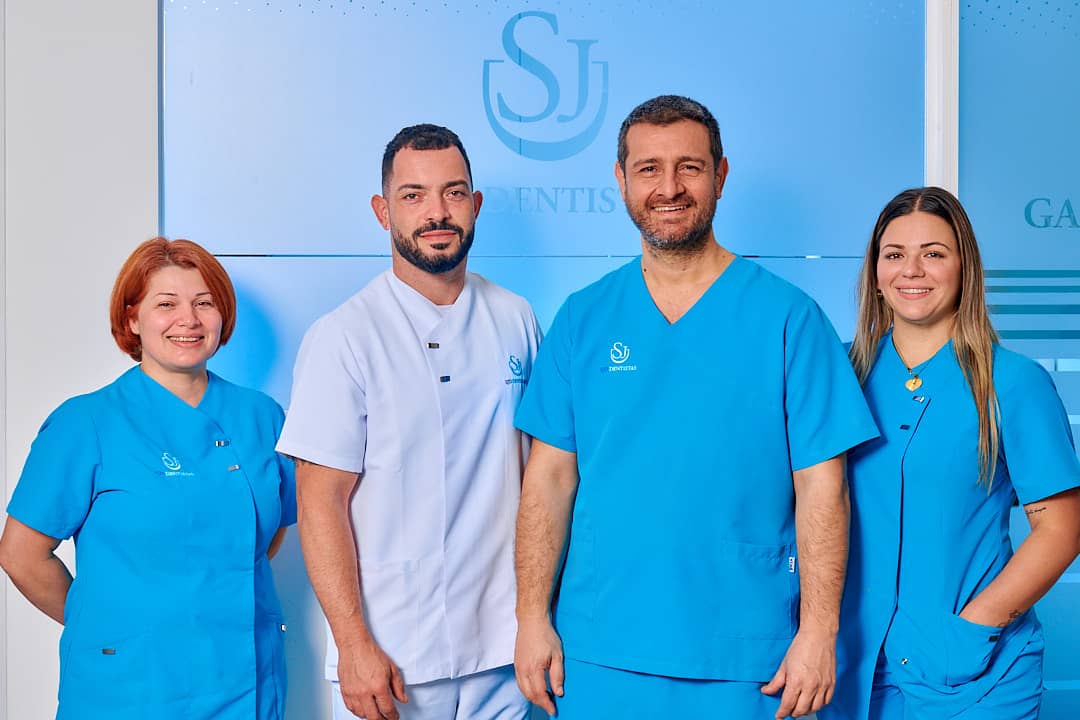Dental Splints in Tenerife

Whether it’s at night to combat bruxism or to prevent injury while playing sports, our customised dental splints improve oral function and protect the aesthetics of your smile.
Designed to fit the patient’s mouth perfectly, these splints are made from durable and safe materials, such as acrylic and silicone, providing a protective barrier between the upper and lower teeth.
What dental problems can be treated with dental splints in Tenerife by SJD Dentistas?
Bruxism: Discharge splints are used to treat bruxism, a condition in which people unconsciously clench or grind their teeth.
Tooth wear: Splints can protect teeth from abrasion and excessive wear.
Temporomandibular joint (TMJ) pain: Splints can relieve pain in the temporomandibular joint by reducing stress on the area.
Sleep apnoea: Oral splints can help treat mild to moderate sleep apnoea.
Misaligned bite: Splints can help correct mild to moderate bite problems.
It is important to note that it is always advisable to consult a dentist to assess whether the use of splints is appropriate for each individual case.

Silicone: Known for its comfort and flexibility, silicone is often used in sports splints and some offloading splints. Its ability to absorb impact and conform to the shape of the mouth provides unmatched protection and comfort.
Biocompatible polymers: For alignment splints and those used in TMJ treatment, we use advanced polymers that are lightweight, clear and extremely comfortable for extended wear.
Each splint is customised from an exact mould of the patient’s mouth, guaranteeing a perfect fit and optimal functionality. Our specialists review every detail to ensure that the splint meets the specific treatment requirements and needs of the patient.
We are committed to using safe and sustainable materials, providing products that are safe for our patients and the planet.
Relieving splints prevent bruxism or nighttime teeth grinding, protecting tooth enamel from premature wear.
By reducing pressure on the jaw, splints help prevent or relieve symptoms of temporomandibular joint (TMJ) disorders, improving jaw function and reducing pain.
Alignment splints correct the position of teeth, which can improve bite and chewing efficiency.
By preventing nocturnal bruxism or nighttime grinding, our splints help patients enjoy a more restful, undisturbed sleep.
Based on this assessment, our specialists recommend the most appropriate type of splint that fits not only the patient’s specific needs but also their lifestyle.
We use advanced technology to take accurate impressions of the patient’s mouth, ensuring that the splint fits perfectly without causing discomfort or irritation.
Before finalising the splint, we carry out fit tests to make fine adjustments, ensuring maximum comfort and functionality. We provide information on the expected durability of the splint and best practices for care and maintenance.
Use cleaning solutions specifically designed for dental splints. These solutions help remove bacteria and keep the splint clean without compromising the material.
Store the splint in a ventilated case when not in use. This protects the splint and prevents moisture build-up, which can encourage bacterial growth.
Do not expose the splint to high temperatures, such as boiling water or direct sunlight, as this may deform the material.
Bring the splint to regular dental visits to allow a professional to inspect it for signs of wear or damage. This is important to ensure that the splint remains effective and comfortable to wear.
Replace the splint when it shows signs of deterioration or when recommended by the dentist. This ensures that you always have adequate protection and support.
Avoid chewing or adjusting the splint with your teeth, as this can cause premature wear.
Maintain good oral hygiene and wear the splint only on clean teeth to avoid transferring plaque and debris to the splint.

Types of dental splints
Unloading splint
Protective splint
Splint for TMJ treatment
CUSTOMER REVIEWS SJD DENTISTS

Todo el personal con una estupenda actitud de trato. Yo me suelo poner muy nervioso en estos casos, pero de verdad que que me han transmitido calma y serenidad.
Clínica en muy buenas condiciones.
Gracias
Por otro lado el funcionamiento de la clínica es inmejorable, rara vez he tenido que esperar más de 10 minutos, siempre te pueden adaptar la cita a tus horarios. Muchas gracias por todo
Gracias 🤩
Han salido contentísimos, muchísimas gracias.
Todo lo que diga es poco para el trato que recibo
Hoy fue un día especial para mí y mis miedos,ellos hacen que me sienta bien y me trasmiten muchísima tranquilidad,son unos profesionales que te hacen sentir como en casa,pero además devolviendote la sonrisa
Prueba superada🥰👌
GRACIAS 🫂
Saludos
Juan Manuel Mesa.

Gracias por todo y por esta ayuda tan grande que hace recuperar la sonrisa.
Absolutamente recomendable.
In this section we will answer the most important frequently asked questions that most customers ask about dental splints.
How long should I wear the dental splint each day?
The recommended wearing time may vary depending on the type of splint and the specific problem being treated. For example, bruxism splints are usually worn overnight. However, it is always best to follow your dentist's specific instructions.
Are dental splints uncomfortable?
At first, it may take a little time to get used to wearing a splint, and because they are custom-made to fit your mouth, they should be comfortable once you get used to them. If you experience persistent discomfort, contact your dentist to have it adjusted.
How do I know if I need a dental splint?
If you experience symptoms such as teeth grinding, jaw pain upon waking, or if you are a person who participates in risky or contact sports, a dental splint may be beneficial. The best way to determine if you need a splint is to consult with your dentist.
Can I eat and drink while wearing my brace?
It is generally recommended not to eat or drink with the splint in place to avoid damage and to maintain hygiene. However, drinking water with the splint on is generally safe.
How do I clean my dental splint?
Clean your splint with warm water and a soft brush. Avoid using toothpaste as it can be too abrasive. You can also use special cleaning solutions recommended by your dentist for deeper cleaning.
What should I do if my dental splint breaks or is damaged?
If your brace is damaged, it is important that you contact your dentist immediately to get it replaced or repaired. Do not attempt to fix it yourself, as this may alter its fit.
How long does a dental splint last?
The durability of a dental splint depends on the material and how it is cared for. With proper maintenance and correct use, a dental splint can last for several years. However, it is important to have it regularly inspected by your dentist to make sure it is still effective and in good condition.
From what age is a dental splint recommended?
Dental splints can be recommended for patients of any age, from children to older adults. However, the need for a dental splint and the appropriate type of splint may vary depending on the age and specific needs of the patient.
For children, dental splints can be used to treat bite problems and to protect teeth during contact sports.
For adults, splints can be used to treat problems of bruxism, teeth grinding, TMJ, and to protect teeth at night or during contact sports. In any case, the recommendation for the use of dental splints should be made by a dental professional.
PAYMENT TERMS
We offer payment facilities
We offer you different payment methods so that you can have the dental treatments you require whenever you need them.
TRUST US
Personalised services
Hundreds of satisfied customers endorse our team of highly qualified dentists who guarantee you the best results.
SPECIAL PROMOTION
Come accompanied on your first visit
Ask for our loyalty rate. You and your companion can benefit from this promotion.
- Calle San Juan, 52,38202 La Laguna
- Avenida Modesto Hernández González, 3,38629
Las Chafiras, San Miguel de Abona













